Sharon and Hamas: How the Likud Bloc Mid-wifed the Birth of Hamas
by Ray Hanania (January 2003)
(Click here to view PDF with sourced footnote citations.)
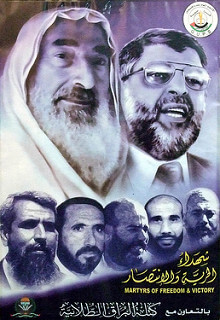
Hamas is considered one of Israel’s greatest threats, but the Islamic terrorist organization found its beginnings in the misguided Israeli effort to encourage the rise of a religious alternative that would undermine the popularity of the Palestine Liberation Organization and Yasir (Yasser) Arafat.
The strategy resulted in the birth of Hamas which rose from these Islamic roots. Israeli Prime Minister Ariel Sharon was a member of the government when the policy was developed in the late 1970s.
Although Sharon and his Likud (formerly Herut Party) government colleagues could not anticipate that the Islamic leaders they backed would eventually evolve into Hamas and suicide bombings, the two have benefited from each other’s extremism over the years.
The Likud strategy to promote an Islamic alternative evolved in response to Arafat’s transformation from a revolutionary leader to the “sole legitimate representative” of the Palestinian people. Arafat was anointed as the only person who could negotiate for the return of the Occupied West Bank, Gaza Strip and Arab East Jerusalem at the Rabat Arab Summit in October 1974.
In addition to hoping to turn the Palestinian masses away from Arafat and the PLO, the Likud leadership believed they could achieve a workable alliance with Islamic, anti-Arafat forces that would also extend Israel’s control over the occupied territories. At the time, the Islamicization of the Palestinian leadership was still very much in its infancy.
But the Islamic Palestinian leaders viewed the relationship with Israel differently. They were eager to accept Israel’s financial backing and an easing on their activities, but only because they feared that Arafat would sign away Palestinian land captured by Israel in 1948.
If Arafat’s weakness was the lack of a long term vision and an inability to resist short term achievements, his Islamic foes always believed that the struggle to liberate Palestine was a long term, slow process.
Violence was always a part of that picture. The Palestinian Islamic groups turned to violence during the first Intifada in 1987. The Intifada (1987- 1993) literally began as an uncontrolled, unplanned explosion of Palestinian frustrations and it gave the Islamicists their first opportunity to attract popular support.
Although Arafat remained the most popular Palestinian leader, he was still in Tunisia when the first Intifada exploded in 1987. As Palestinians fought back against Israel’s occupation, Sheik Yassin decided it was time to launch an armed wing, Hamas, to seek to lead that armed struggle against Israel’s military.
Eventually, though, Hamas evolved into a much more extremists movement, not only targeting Israeli military. Hamas initially turned to the more extreme form of violence, suicide bombings, as a means of retribution for egregious Israeli attacks against Palestinians.
The first Hamas suicide bombing occurred in April 1994 in response to the massacre of 29 Muslims months earlier who were praying at the Hebron Mosque. The number of Hamas suicide bombings only steadily increased since, bringing the Middle East today to its worst crisis in decades.
Later, in the second Intifadah, suicide bombings became the weapon of choice as more and more Palestinians turned away from Arafat’s secular solution through compromise with Israel and toward faith-based religious fanaticism.
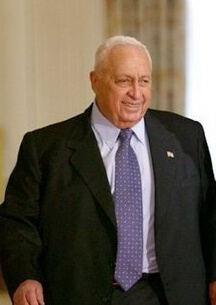
The failure of the peace process to achieve a workable compromise, the new Intifada or “Palestinian rebellion,” the increased terrorism and suicide bombings, and changes in how the world views political violence and terrorism since Sept. 11th have all given Likud and the Sharon government a new mandate.
Angered by the suicide bombings, the Israeli public has given Sharon wide latitude to forcefully respond to Hamas violence and the intifada. He has eagerly pursued this mandate as a front to achieve his real political agenda to undermine Arafat and to prevent Israel from accepting a peace accord that results in the establishment of an independent Palestinian State.
Ironically, this is Sharon’s second try to destroy Arafat. He led the Israeli army assault on the PLO in Lebanon and Beirut in 1982, but that ended in embarrassment for Israel when the army unilaterally retreated. Sharon left with his reputation tarnished, blamed for the massacre of hundreds of Palestinian civilians at the Sabra and Shatila refugee camps.
As the peace process collapsed and as Hamas terrorism increased, Sharon’s agenda found new life. In September 2000 Sharon went to the Haram al-Ash Sharif (Temple Mount). Although events had been set in motion by the collapse of peace, Sharon;s visit and his declaration that Jerusalem will forever be the capitol of Israel sealed the fate of the unavoidable violence that consumes Palestinians and Israelis today.
Likud and Islamicists make strange bedfellows
In 1977, newly elected prime minister and Likud (Herut) founder Menachem Begin decided drastic steps were needed to block Arafat’s return.
A year later, seeking to undermine Arafat’s popularity in the Occupied Territories, Begin’s government approved an application from a 42-year old quadriplegic religious leader in the Gaza Strip, Sheik Ahmad Yassin, to license his humanitarian organization, the Islamic Association. Later, with the explosion of the first Intifada, the Islamic Association launched a military arm called Hamas.
Begin’s successor was Yitzhak Shamir. Both Begin and Shamir were leaders of the first terrorist organizations that operated in Palestine in the 1940s.
Under Begin and later Shamir, Israel created, funded and controlled the “Village Leagues,” a system of local councils managed by Palestinians who were hand-picked by Israel to run local city and village administrations.
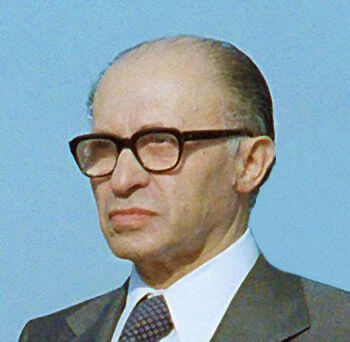
The plan was devised by Sharon, who was Israel’s Defense Minister. Sharon appointed Menahem Milson, a professor of Arabic literature and former Hebrew University Dean, as its first Civil Administration leader in November 1981. Less than one year later, the two broke over Sharon’s role in the Sabra and Shatilla massacres and Milson resigned.
Over the objections of many Palestinian Islamic leaders including the Commissioner of the Muslim Waqf in the Gaza Strip, Rafat Abu Shaban, Israel registered the newly formed “Islamic Association” which Yassin founded.
Yassin was willing to cooperate with the Likud government because he, too, shared the goal of undermining Arafat’s secular influence over the Palestinians. More importantly, and in line with Likud policies, he sought to block the creation of a Palestinian State based on land-for-peace.
Israel’s Likud government permitted Yassin to launch a newspaper and to set up charitable fundraising organizations. With funding Yassin raised and with Israeli funds directed through the Village Leagues, the Islamic Association built new mosques, new schools, hospitals and medical clinics. The group established social service and humanitarian agencies and even job creation venues. Despite its later turn to armed struggle and suicide bombings, Hamas meticulously directed nearly 95 percent of the funds it raised to these worthy humanitarian projects.
Yassin’s followers won significant influence over the Village Leagues system, another Israeli supported scheme intended to undermine the PLO’s influence and strengthen the hand of “local leaders” that Likud believed could be co-opted politically.
Yassin was not initially involved with violence. Most of the violence was directed either by Arafat’s Al-Fatah organization, based in Lebanon, or by the other PLO umbrella partners like the Popular Democratic Front for the Liberation of Palestine. Inside the occupied territories, another Islamic group called Islamic Jihad was struggling to gain support among Palestinians living under occupation.
The “Islamic Association,” was a shadow organization and prodigy of the more radical Moslem Brotherhood, founded in Egypt in 1928 by Hasan al-Bana. The group created a Palestinian branch in the 1930s but waged a mainly rhetorical battle against oppression in the Arab World.
Initially, the Moslem Brotherhood and Sheik Yassin’s Islamic Association were not supportive of armed struggle against Israel. Yassin adopted the Moslem Brotherhoods approach toward a slow Islamicization of the region.
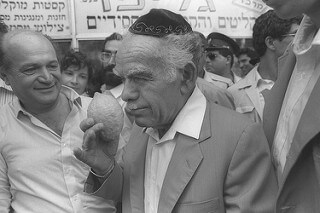
In 1984, Shamir was forced into a coalition government with Labor Party’s Shimon Peres. Under a shared-leadership agreement, Peres held the office for two years until 1986 before returning it to Shamir. During those two years, the Likud party leaders saw firsthand the seriousness of behind-the-scenes negotiations between Labor Party leaders and Arafat, who was exiled in Tunisia.
Yassin and the Islamic Association benefited from a system of Israeli controlled “Village Leagues,” sometimes called Village Councils. The Village Leagues where largely funded by Israel. But the Islamic Association was allowed to raise tens of millions more each year from supportive Arab regimes angry with Arafat. The creation of the Village Leagues was Israel’s first effort to encourage an alternative to the PLO.
Sheik Yassin used the money to operate a network of schools, medical clinics, social service agencies, religious institutions and provide direct services to the poverty stricken Palestinian population.
Israel saw benefits in the leagues which became a breeding ground for Palestinian collaborators who were blackmailed or bribed into reporting on the activities of other Palestinians. Many of them held positions of leadership in the Village Leagues and were friendly to Israel.
The Israeli military gave the League members protection and widespread powers. As many as 200 of the league members were given weapons training by Israel. Israel’s Shin Bet recruited paid informers from this network and Israeli sources estimated the number of informants were in the thousands.
Israel Military Government employed as many as 19,000 Palestinians, with 11,000 of them working as teachers, clerks and administrators.
Always the survivor, Arafat and the PLO agreed in 1988 to accept the “two state” solution based on “land for peace” negotiations. While Likud responded by trying to sell “autonomy” to the Islamicist movement, the response of the Islamic Association was unexpected. Reacting angrily to Arafat’s decision to recognize Israel, and seeking to play to Palestinian emotions during the Intifada, the new organization, Hamas, openly embraced armed struggle against Israel.
Arafat’s first act was to impose controls on Hamas, while Israel moved to more aggressive policies expelling, jailing and even assassinating Hamas leaders.
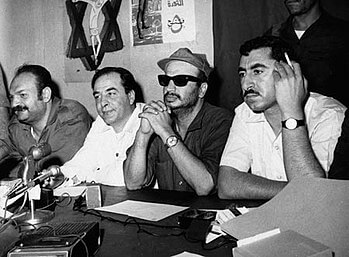
As secret talks with Labor Party leaders advanced, Arafat ordered his loyalists to force Village League members to resign in 1988 sparking violence between Hamas and Arafat’s Al-Fatah supporters. The gap between Hamas and Al-Fatah widened when Al-Fatah commemorated the 20th anniversary of the March 21, 1968 battle of Karameh.
Karameh was a village in Jordan at the border with the West Bank that consisted mainly of Palestinian refugees. There, Arafat and his Al-Fatah faction set up headquarters and directed their armed struggle against Israel.
Israeli troops invaded Karameh but confronted fierce resistance from the Arafat-led guerrilla defenders. It was particularly important because of the humiliation Arabs shared for the defeat to Israel in June 1967. The battle successes added to Arafat’s growing charisma among Palestinians.
During the commemoration, Palestinian leaders of the Village Leagues began their mass resignations. The Palestinian Mayor of Beitunia, Abdallah Rezaq, was the first to dissolve his municipality’s council.
The only thing that stopped Hamas from growing further was the return of the Labor Party to power in 1992 and the return of Yasir Arafat to the West Bank and Gaza Strip.
Hamas is born
Strengthened by Village League funding and a vast network of charitable institutions that were popular among the Palestinian masses, Yassin authorized the establishment of a military arm of the Islamic Association in 1987 that he called Hamas. It launched its first attacks in January 1998, both against Israeli military targets and even against Arafat’s Fataha loyalists in the Gaza Strip.
The acronym Hamas comes from the Arabic name, the Islamic Resistance Movement (Harakat al-Muqawama al-Islamiya). In English, the word Hamas translates into “zeal.” It is appropriate to Yassin’s goals. The Moslem Brotherhood and its sister organizations pursued a policy of gradual Islamicization of the Arab World and Palestine. It was a policy that Hamas rejected as being too slow.
There is a real irony in the transformation of Yassin’s organization from a benevolent religious foundation to a guerrilla movement. Begin and his successor, Yitzhak Shamir, had both headed the first two terrorist organizations to operate in Palestine during the 1940s. Shamir had led the Stern Gang while Begin led the larger Irgun Zvi Leuhmi. The two groups worked in tandem and were responsible for introduction of terrorist techniques into Palestine including car bombings, assassinations, kidnappings, hijackings of military vehicles and the lynching of British soldiers in the olive groves outside of Jerusalem. They were responsible for the near destruction of the car-bombed King David Hotel and for the massacre of civilians at the Palestinian village of Deir Yassin near Jerusalem.
Begin and Shamir understood exactly what they had created. Knesset Member Avraham Poraz (Shinui) was among a litany of Israeli leaders who blamed Likud for Hamas. “The Likud has got Hamas on its hands because it refused to talk to the PLO,” he said.
Hamas quickly found itself in competition with another religious group banned by Israel, Islamic Jihad. Both sought to disrupt the occupation and seize Palestinian leadership from Arafat.
Islamic Jihad distributed a leaflet claiming responsibility for the killing of restaurateur, Ya’acov Shalom, in Jerusalem’s Ein Kerem neighborhood on May 20, and a fatal bomb attack in the Mahane Yehuda market the week before. It also labeled Jordan’s King Hussein, a Hamas backer at the time, as a “butcher.” That was an apparent reference to the King’s suppression of unrest in Palestinian refugee camps following another attack at Rishon Lezion, an Israeli settlement outside of Tel Aviv.
But the real rivalry for Hamas was with Arafat’s Fatah loyalist.
During the first Intifada, Hamas enforced business closures and boycotts as a means of protesting Israeli policies and as a way to control the Palestinian population. Hamas constantly challenged PLO political positions and thwarted PLO efforts to direct the Intifadah from abroad.
For example, in January 1990, Arafat deputy Abu Iyad publicly complained that Soviet Jewish immigration to Israel was undermining the peace process because new immigrants went directly to settlements, and settlements were created to accommodate this immigration. In response, Hamas issued an order closing all businesses in the West Bank and Gaza Strip to protest Soviet Jewish immigration, not simply to join in the protest but to also steal the thunder from the distant PLO leaders.
Shamir was surprised by the Islamic violence. He quickly ordered the arrest of Hamas political leader Dr. Abdel Aziz Rantisi and then a full scale crackdown on Hamas and the arrest of Sheikh Yassin. But it was too late. Hamas was now permanently entrenched among a hard core and growing cadre of Palestinian religious zealots.
By February 1990, Israeli officials estimated that Hamas enjoyed solid backing during the Intifada from 30 percent of the residents of the Gaza Strip where it was based. This increased popularity only hastened Arafat’s decision to accept a compromise with Israel in the hopes of returning and taking charge and prompted Shamir’s Labor Party successors to accept an Arafat deal.
Under Labor Party pressure and a “shared government” arrangement with Likud, Israel agreed to participate in peace talks with the Palestinians and Jordanians in Cairo. Still, Shamir tried to reduce the role of the PLO by insisting on vetoing the appointment of the Faisal al-Husseini, an Arafat confidant and the PLO’s Jerusalem representative, to lead the the Palestinian delegation.
Arafat immediately tried to control Hamas, partly to demonstrate his authority and partly to show his Labor Party partners that he could deliver. But initial offers of compromise and alliance from PLO officials were consistently rejected and Hamas remained dedicated to its hardline, Islamicist ideology which rejected any form of compromise with Israel.
The more the Labor-Arafat peace process advanced, the more Hamas turned to violence. When Husseini and other PLO officials denounced the murder of Jewish tourists in Egypt in February 1990, Hamas countered by sending vehicles with loudspeakers through the streets of major Palestinian cities praising the attacks and denouncing the PLO for its criticism. They argued against peace with Israel and more violence.
The Likud desire to undermine Arafat remained strong even after Hamas had been declared a “terrorist organization” and the Labor peace initiative with Arafat was at its height. In the months after the White House peace signing, some leaders of the Israel’s security forces pursued contacts with Hamas leaders who were in Israeli jails in the hopes of getting them to embrace peace at the expense of Arafat’s leadership. The Israelis wanted to use Hamas as a means of pressuring Arafat into making more concessions.
It didn’t work.
Hamas and Likud benefit from violence
There is a natural affinity that exists in a limited way between the policies and goals of Hamas and the political objectives of the Likud Bloc that has brought them together.
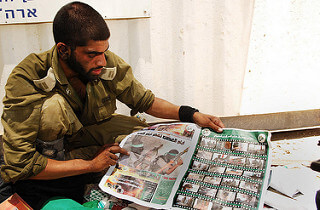
Every time Israeli and Palestinian negotiators appeared ready to take a major step toward achieving peace, an act of Hamas terrorism has scuttled the peace process and has pushed the two sides apart.
The startling ease with which terrorism has undermined peace is a testament to the fragility of the peace process and the political weakness of both Israeli and Palestinian negotiators. Two specific acts of Likud-inspired violence derailed the momentum of the peace process, too.
Terrorism has been the primary common denominator that exists in the up and down relationship between the leadership of Israel’s Likud and the Palestinian Hamas movement. It’s not that they are working together, but that their goals are the same.
Acts of terrorism can be directly associated with changes in the political leadership of Israel — influencing the defeat of Labor Party government and the rise of the Likud.
In the last quarter century, Likud Party candidates have served as Israel’s prime ministers for 17 years, more than double the eight years served by Labor Party candidates.
Since 1977, four Likud candidates have served five times as prime minister, while three Labor candidates served four times. (Likud’s Menachem Begin, 77-83; Likud’s Yitzhak Shamir, 83-84; Labor’s Shimon Peres, 84-86; Likud’s Shamir, 86-92; Labor’s Yitzhak Rabin, 92-95; Labor’s Peres, 95-96; Likud’s Benjamin Netanyahu, 96-99; Labor’s Ehud Barak, 99-01; Likud’s Ariel Sharon, 01-present.)
Efforts to achieve peace between Arafat and Labor were marred by the violence on both sides with Hamas attacking Israeli targets and Likud loyalists and members of the pro-Likud settler movement attacking Palestinians.
One of those likud-inspired settler fanatics was Dr. Baruch Goldstein. In February 1994, Goldstein strolled through Israeli security with an automatic weapon and opened fire on Muslims praying at the Heborn Mosque. He killed 29 Muslims. Goldstein took a page out of the Likud ideology and hoped the massacre would derail the peace process with Arafat.
The Goldstein attack so outraged Hamas leaders that they retaliated in April 1994 with a Hamas bomber who drove an explosive laden car into a civilian bus in the Israeli city of Afula. Eight people died and 50 were wounded.
Likud-inspired violence was not reserved for Palestinian targets. Less than a year later, an Israeli fanatic inspired by Likud rhetoric assassinated Rabin. Rabin’s widow, Leah Rabin, directly placed the blame for her husband’s assassination on the Likud party and its anti-peace rhetoric. Leah Rabin declared that the assassin was incited to violence by the vicious language of Likud’s silver-tongued leader, Benjamin Netanyahu.
Rabin’s murder undermined the Labor Party’s future and sabotaged the Israeli-Palestinian peace process pushing all sides back to violence.
In otherwords, violence did for the Likud what violence had achieved for Hamas in terms of stopping the peace process.
Politically, Hamas and Israel’s Likud Bloc share several common goals, each for different reasons. They both oppose the Land-for-Peace formula and object to the creation of an independent Palestinian State. Hamas seeks to establish an Islamic State in Palestine while the Likud seeks the formal expansion of Israel into the occupied West Bank and Arab East Jerusalem. Likud seeks to annex the territories providing the Palestinians with administrative autonomy but not independence or sovereignty.
In contrast, the PLO and the Labor Party also share several goals and oppose the policies of Likud and Hamas. Both accepted in formal written agreements in September 1993 at the White House a peace accord that recognized Israel’s right to exist and the Palestinian right to statehood.
While Likud and Labor battle over ideology and politics, Hamas differs with the PLO on issues of religion and it rejects compromise.
Hamas views the PLO as an important organization but much like a “wayward brother.” It’s stated goal is the creation of an Islamic State in Palestine, one that subjugates not only Jews but Christians and other religions, too. The PLO has recognized Israel and, like the Labor Party, has accepted the Land-for-Peace principle.
While Hamas views all Israeli politics as identical, its violence twice helped elect Likud candidates to the office of Prime Minister.
It is this politics of opposition that drives Likud and Hamas to share similar goals.
Arab regimes flipflop on Hamas
As peace moved forward, the Arab World also shifted from supporting the Islamic militant movement to opposing it.
The Muslim Brotherhood and later Hamas enjoyed the backing, for example, of King Hussein of Jordan and several other Arab government leaders not just during its rise, but even years later.
In Jan. 1991, the new Jordanian Government included members of the Muslim Brotherhood, insuring that Jordanian funds would continue to Hamas.
In a show of how important King Hussein viewed the religious organization, King Hussein pressured Israel to release Yassin from his Israeli prison in 1997. It was a price demanded by the monarch for his freeing of Israeli Mossad agents who were arrested after bungling the attempted assassination of a Hamas leader in Jordan.
After his release, Yassin devoted his energies to repairing damage to Hamas’ educational and charitable institutions inflicted during Israel’s sweeping 1996 crackdown. Hamas’ military wing directed attacks from its safe haven in Amman, Jordan.
Like many Arab leaders who viewed Arafat as a threat, King Hussein was willing to live with Hamas militancy as a counter-balance to Arafat. Jordan viewed Hamas as a natural rival to Arafat’s leadership. Despite his public rhetoric, the Jordanian Monarch could never forgive Arafat for his efforts to destabilize his government. Half of Jordan’s population consisted of Palestinians, most of them refugees from the 1948 and the 1967 Arab-Israeli wars.
As Hamas stepped up attacks against Israel and was denounced by Israelis as a terrorist organization, Hamas enjoyed growing support among the Arab regimes. Ironically, it was easier to show lipservice to Hamas than to lead their own wars against Israel.
Arafat’s misunderstood support of Iraq during the Gulf War did much to strengthen Arab support of Hamas. Hamas received more financial support from Kuwait after Hamas leaders publicly denounced Saddam Hussein and likened the Iraqi occupation of Kuwait to the Israeli occupation of Palestine.
Other Arab Gulf countries like Saudi Arabia continued to channel funds to both the PLO and Hamas, but favored Hamas’ religious militancy and its Islamic charitable foundations and social service agencies.
Arafat was publicly humiliated by Kuwait at the 1990 “Baghdad summit” when he demanded to know why Kuwait had paid less than one-eighth of the money it had promised the Palestinians. The emir of Kuwait, Sheikh Jabber al-Ahmed al-Sabah responded by producing data that showed in fact Kuwait had continued to support the Palestinian cause, but through Hamas instead of through the PLO.
As the Arab government’s slowly supported the Arafat-Rabin peace accords, support for Hamas began to wane. Hamas turned elsewhere, to Iran’s Islamic government. In August 1999, Jordan closed the group’s political bureau, arrested its leaders and prohibited Hamas from operating out of Jordan.
As the peace process progressed, Hamas influence continued to fall. Hamas struggled to sustain its network of charitable and social agency service agencies in the West Bank (notably Tulkarm) and also in Gaza where they had more support. Hamas shifted most of its military and political leadership from Amman, Jordan to a more sympathetic Damascus, Syria.
Still, the network that Shamir and the Likud helped create for Hamas preserved its funding resources. Even after breaking with Jordan and other Arab countries, sources estimated the Hamas budget at between $40-70 million a year.
The peace process teeters on the brink of Hamas attacks
In early April 1990, Palestine National Council Chairman Sheikh Abdel Hamid a-Sayeh invited Hamas to join a committee preparing the next Palestine National Council meeting. (The PNC was the umbrella group that included representatives of most Palestinian organizations and mainly the PLO.) Hamas circulated a memorandum in the territories on April 6, 1990 setting for the conditions the PLO would have to meet: Hamas would only join the Palestine National Council if the PLO withdrew its “acceptance of partition,” rejects territorial concessions, and refuses to recognize Israel. The statement also demanded that Hamas be given up to 50 percent of the PNC seats, and a modification of the Palestinian National Covenant “in accordance with the faith of the Moslem Palestinian people and its glorious heritage.”
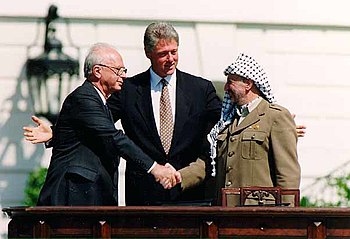
Even President Clinton recognized the ability of Hamas to disrupt the peace process. On January 24, 1995, Clinton signed an Executive Order prohibiting transactions with Hamas due to their potential for disrupting the Middle East peace process. This included all of Hamas’ subgroups including the Izzedin Al-Qassem Brigades. Even with the change in attitudes of the Arab governments, pressure from the Clinton Administration and a reversal in Israel’s policies toward Yassin, the road to undermining Hamas’ extensive funding network was difficult.
Eventually, Hamas was forced to consider, at least briefly, a possible compromise with Arafat in order to survive. By 1998, Yassin publicly broke from the Hamas Charter and participated at a meeting of the PNC. His presence prevented the PNA from declaring Palestinian statehood, but it brought a harsh rebuke from the Hamas leadership outside of the territories. Hamas political head Khaled Meshal and treasurer Musa Abu Marzook, both in Jordan, and Hamas’ Damascus representative Imad Alami all urged Yassin to resign.
As peace falters Hamas influence rises
Support for Hamas declines as the peace process moves ahead and increases as the peace process falters. Prior to the peace process, support among the Palestinians for Hamas was estimated by the Israelis at 20-40 percent in the West Bank and 60-80 percent in the Gaza Strip. This fell to 15-25 percent during the peace process.
And undermining the peace process has always been the real target of Hamas and has played into the political ambitions of the Likud. Continued Hamas suicide bombings and violence has played a significant role in undermining and bringing the peace process to a grinding halt, and set the stage for Sharon’s election over Labor Party leader Ehud Barak in 2001.
As the peace accords lumbered ahead, Hamas stepped up its terrorist suicide attacks. About a dozen suicide bombings were attempted in the months after the PLO-Israel accord was signed at the White House in September, 1993.
Initially, the peace process persisted in the face of these heinous terrorist attacks. But it couldn’t stand the pressure of the gut-wrenching images of suicide bomb attacks. In February and March 1996, Hamas launched a series of suicide bombings in retaliation for the Israeli assassination of alleged Hamas bomb-maker Yahya Aiyash the month prior. These attacks contributed mightily to bringing down the Peres government and helped return the Likud back to power electing the more hardline but silver-tongued young Turk, Benjamin Netanyahu.
The wave of deadly Hamas bombings took 60 Israeli lives in eight days, prompting Arafat to clamp down on Hamas even more – some 1,000 Palestinians were arrested and Arafat’s Palestinian National Authority government, established under Labor, even ousted Hamas from some of its mosques. The suicide attacks continued through 1997 giving Netanyahu public support to halt the peace process and reverse agreements made by the murdered Rabin.
Netanyahu ignored Arafat’s efforts to crackdown on Hamas and the peace process came to a grinding halt.
Similarly, Hamas suicide bombings during the Barak administration coupled with the failure to reach a peace accord on President Clinton’s timetable, and Sharon’s provocative incursion to the “Temple Mount” on September 28th, 2000 provoked the second Intifada.
Although the Israelis insist that second Intifada was responsible for a wave of Israeli killings, during the first week of the conflict, 50 Palestinians had been killed and five Israelis had died. Among the dead were nine Palestinian protesters whose deaths sparked the Intifadah’s start. The Israeli response was repressive and heightened Palestinian response. And, when two Israeli reservists (suspected of being undercover government assassins) were captured and murdered viciously in Ramallah on October 12th, 2000, the slide to total Palestinian-Israeli conflict was already set in stone.
Barak declared his decision to resign to give himself a 60-day window before elections to controlt he conflict and authorized secret meetings at Taba where Palestinian and Israeli negotiators desperately tried to reach an accord.
But, it was too late, Sharon had achieved his objectives. Sharon did not need a major Hamas suicide bombing to win his election against Barak. The Sharon inspired Intifadah and the violence it caused on both sides swung Israeli voters to the hard right, giving him a landslide victory against Barak on Feb. 7, 2001.
Clearly recognizing that their violent strategy was bringing down the Arafat government, halting the peace process and playing into the emotions of the Palestinians, Hamas launched another wave of suicide bombings in the week after Sharon’s election. Sharon used these attacks as the pretext to launch a massive invasion of PNA controlled areas of the West Bank and decimating Arafat’s government infrastructure.
Hamas terrorism played into the rage and the frustrations of the Palestinian people, who helplessly watched as the promise of peace evaporated before their eyes. They had never tasted its fruits but only heard its empty promises. The were a people on the edge and easy victims for Sharon’s political manipulations.
The conflict continues its escalation. The number of Palestinian and Israeli dead continues to climb. The terrorist attacks on September 11th by madman Osama Bin Laden in the name of Islam only served to further build a barrier that prevents reasonable people to achieve a peace.
And, once again, the real benefactor of the violence and conflict is Israel’s right wing Likud Bloc and its new leader, Ariel Sharon, the man that his fanatic supporters affectionately call “Bulldozer.”
(RAY HANANIA is a Palestinian American author and veteran award winning journalist. Based in Chicago, he is a columnist on Middle East affairs for Creators Syndicate. Hanania is the managing editor of The Arab Daily News www.TheArabDailyNews.com.)
Related articles


- Israelisnipers shooting and killing hospital workers in Gaza - December 11, 2023
- CAIR Condemns Israeli Executions of Wounded, Unarmed Palestinian in West Bank - December 11, 2023
- Arab and Muslim American voters face a “simple choice” between Biden’s inhumanity and Trump’s edgy politics - December 9, 2023














 Palestine – A Blessed Land Led by Incompetent Leaders
Palestine – A Blessed Land Led by Incompetent Leaders Backgrounder: What Is Hamas?
Backgrounder: What Is Hamas?


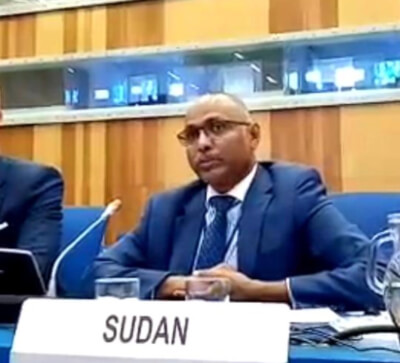






Comments on “Sharon and Hamas: How the Likud Bloc Mid-wifed the Birth of Hamas”